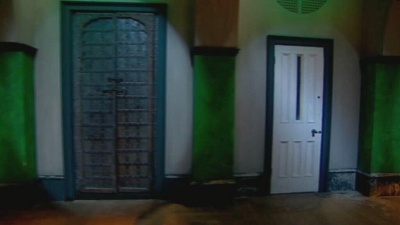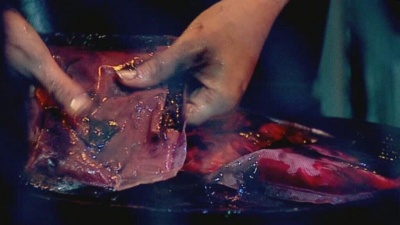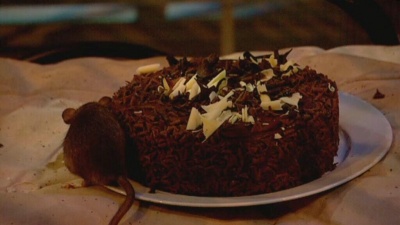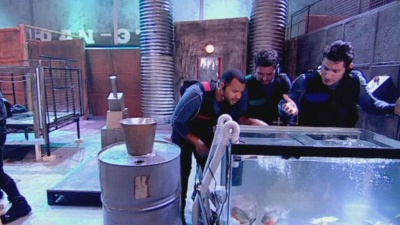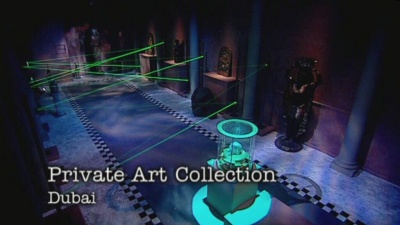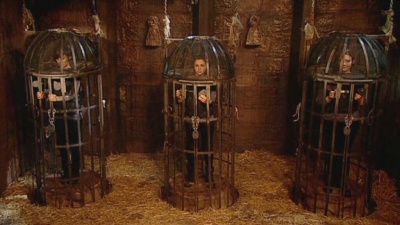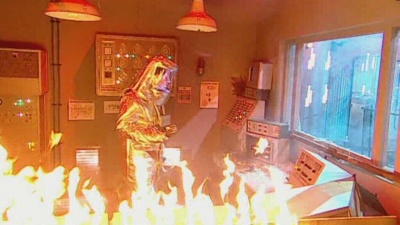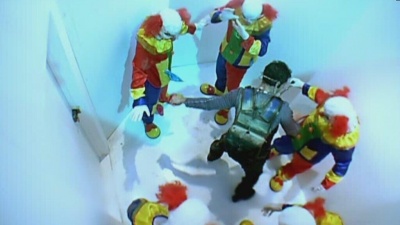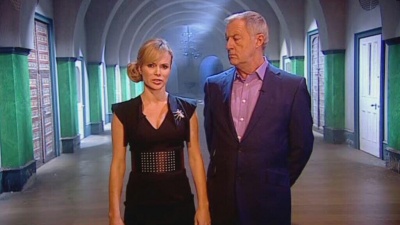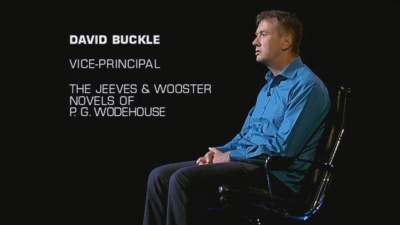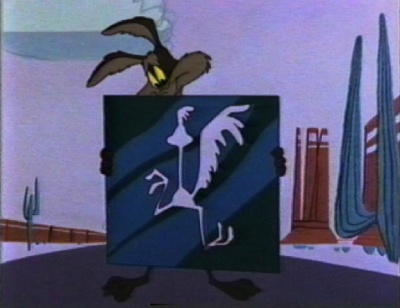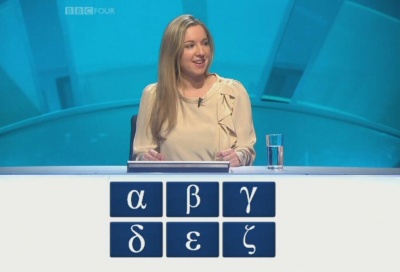Weaver's Week 2010-04-25
Last week | Weaver's Week Index | Next week
We hear that a film director wants to make a game show. Michael Bay is previously famous for such lacklustre fare as Armageddon (the one where Bruce Willis blows up an asteroid), Poole Harbour (the one about a sleepy resort in Dorset), and Transformers (the one where there's no plot... no, the other one). He's pitching One Way Out to various producers, and describes it as "contestants competing against each other in extreme conditions in hostile environments." The director goes on, "Unique twists, death-defying challenges, stunning visuals, reinventing the genre, showing just how far people will go when they are stripped of their bare necessities and forced to do whatever it takes to survive."
No-one has ever done anything like this before. Nothing like this has ever been seen on television anywhere in the recorded history of television. Two egos will enter. Only one can leave.
Contents |
The Door
ITV, 2 and 3 April 2010
In this show, six contestants compete against each other. They're working in hostile environments, and doing battle in extreme conditions. Not least because one of the people they're working with is Amanda Holden, whose contribution to proceedings has now been accounted for.
So, who are these scintillating six? Well, there's Dean Gaffney, former East Ender. Jenny McAlpine, an actress about whom we knew nothing before, and still don't after. Sorry. Frankie Sandford, singer with Blue Peter house band The Saturdays. Keith Duffy, host of hit globe-trotting ITV2 reality show The Race. (What, you mean you forgot to put this on your UK Gameshows General Election ballot? Oh.) Louisa Lytton, who appeared on The Eastenders, apparently. And Michael Underwood, twelve, from Hertfordshire. And Michael is the team's captain.
Sorry, got a bit carried away there, this isn't 1990's The Crystal Maze children's special – or, as Frankie would have called it at the time, goo goo gaa gaa goo. Michael is, of course, the host of CITV's groundbreaking Jungle Run and other excellent entertainment shows.
Anyway, these people have gathered in ITV's World of Doors. It is, literally, a world filled with doors of all varieties. There's not been such a large collection of shut doors on television since the last Larry Grayson convention. Front doors, back doors, side doors. Doors with glass, doors with wood, doors with plastic. Doors with handles, doors with letterboxes, and if you think we're going to make the joke Paul Merton did on last week's HIGNFY, you're sorely wrong.
Behind each of these doors is a challenge. The challenges are aimed at stretching the celebrities to breaking point, and possibly a little beyond. They'll confront their fears and terrors – darkness, dogs, bright lights, spiders – but above all the fear that drives every celebrity, that of failure. No room will allow everyone to escape: each will claim one victim, locked in as surely as a harmonica follows a bald man.
Take, for instance, the opening challenge. The team must work together to present eyes to a retinal scanner. But are their own eyes going to work? Of course not, that would be far too simple. No, the eyes they need are hidden in bags of raw meat in barrels above their heads. Only by presenting these detached retinas to the scanners will the team be able to progress. They'll then go through a maze with some barking dogs to retrieve keys, and then have to put their hands in jars of scorpions and spiders to retrieve keys.
Throughout, there's great attention to detail – when the eyeballs were correct, we heard the notes from "Close Encounters of the Third Kind", for absolutely no reason other than they could. The second game began in a jail cell, where there was a cake. Inside the cake, a file. A nail file. And there was a rat, presumably hoping to see top ratfan Frankie Saturday, but she'd already been detained by the snakes.
There was a welcome level of attention to detail throughout – not least of the traditional The Adventure Game variety. If a door's meant to be locked, it really is locked. If a piece of something is meant to be somewhere, it actually is there. The ground is wet where this makes sense in the plot, the fire is real fire. We've no doubt that the smells were accurate too – either that, or Dean Gaffney's main contribution to the show (a lot of retching) means he's a far better actor than we've ever given him credit for.
The edge was taken off the scariness by the knowledge that everything had been approved by the health and safety people. The dogs in their cages couldn't lay so much as a tooth on the people crawling in the maze, and the piranha fish were overfed and bloated. Has anyone seen former ITV chairman Michael Greed lately? Just asking... The scorpions and ravens weren't harmed during the making of the show, and if the celebs really wanted out, they could get out, with no harm other than to their pride. This happened to Louisa Lytton in the second challenge, completely taking the edge off of proceedings.
From time to time, there were some terribly bad production decisions. The first game came to a grinding halt with two contenders remaining, and the last two had to start over. This was an unsatisfactory and slightly unfair decision to begin with, and proved even more ill-starred when the additional game was solved in no time at all.
That we can put down as bad luck. What we can't forgive is the presentation: the contestants see the challenge for themselves, then there's a fake trailer for a fake film voiced by Deep-Voiced Voiceover Man. Chris Tarrant's post-production commentary (and a little live commentary, directly addressing the contenders) is enhanced by some footage of post-match interviews by the contestants. We'll suddenly cut from a shot of Michael Underwood telling the rats to get out of his way, to Michael talking to the camera, explaining why they're as pesky as Sid and Elvis. Opinion is divided as to whether this is actually an enhancement or not – we suggest that it does actually work on this show, as there's a good chunk of actual game footage, and asking people about something we'd seen ages ago doesn't work.
After the rumble in the dungeon, the second night was a series of head-to-head challenges, with only the winner progressing to the final. For our money, the worst game by quite some distance was the opening semi-final. This challenged the competitors to work through a maze of laser beams without breaking them. For absolutely no reason, the celebs were issued with red glasses, ostensibly for "protection", but really so that they couldn't see the beams. With an ad break interrupting this, there was something like ten minutes of entirely frustrating viewing, it tested nothing more than our ability to wait for something interesting to turn up. Whenever the contenders broke a beam, they had to return to the start and reset it. At the end of the maze was a crystal skull, protected by a cage, and the cage had a little maze in its base; whenever the contender made an error, the cage would lock for some seconds. We'd rather have had the contenders able to see their way through the maze, but whenever they hit a laser beam – or triggered a trap at the cage – they would have had to reset and repeat. Pass through the laser maze lots of times. We're nasty like that.
What we did really rather like was the way The Door clearly owed a lot to the French version of Fort Boyard. Not just the length of the show – without the commercials or the constant coming up / previously around each commercial break, it would have run at about 80 minutes, and we reckon that's about right for the Fort, too. The opening challenge had people putting their hands into jars they know contain nasty stuff, exactly like a traditional key game. There was some crawling about in dark tunnels, which we're sure has been a Challenge in the past. The move along a conveyor belt while liquid descends from above, that's another classic key game.
People who failed (or quit, if they are Louisa Quytton) their challenge on the opening night were sent to The Dungeon, which has cages people can stand up in, and use keys to release themselves. That's something La Boule set his captives on at least one of the UK series of Boyard. After escaping from the cage, they had to work their way out through a further path of nastiness, something familiar from more recent years of Fort Boyard.
All that said, we reckon that ITV might actually be doing something right here. Take some celebs, give them taxing and difficult things to do, and you're already half-way towards a show that's worth watching. Push their limits, and they'll learn something about themselves, and they'll bond – Chris Tarrant said in interview that the six had quickly become firm friends. We're not surprised, there's nothing like a good fright and a good battle to turn acquaintances into battle-hardened buddies.
Moreover, this show is both similar to, and different from, what we've come to expect from ITV. Yes, it involves celebrities; yes, it has Chris Tarrant hosting. (And Amanda Holden, apparently. Can't say we noticed) But it's different from the standard ITV show, as it's edgy, it's dark, it's a bit dangerous. It's not the sanitised, safe, homogenous pulp that ITV generally serves up these days. The Sunday schedule included All-Star Mr and Mrs with Gareth Gates and Suzanne Shaw, a billing that could hardly be safer if it were surrounded by yellow-and-black safety tape.
Yes, The Door had flaws – Deep-Voiced Voiceover Man's voiceovers added nothing, the "coming up" / "previously" bits were overdone, the second episode could perhaps have lost a few minutes in the edit, and it was a shame that Frankie Saturday wasn't allowed to give her usual good value for money. Indeed, the show might have worked better in one night, whether in one or two parts.
But the heart of the show, the challenges themselves, they were more right than wrong. The first show went long on revolting things (fish guts, animal carcasses, rats, sewers), the second tested pain and endurance, and finished with a logical deduction that sorted out the winner from the loser. There are many variations on this idea, many more things to test – we're not sure how one might go for vertigo in a studio setting, even the bible that is Fort Boyard doesn't help – but there's lots of room to do different challenges each time. Indeed, The Door's modular nature insists each part be constructed independently of the others.
A little more humour from the host wouldn't go amiss, we think the show could have laughed at the contestants just a little, or encouraged them to laugh at themselves. As it was, the only laugh-out-loud moments came as Keith Duffy tried to remember a ten-note tune, something he'd never done in his previous career, but that would win big on Push the Button. Some mechanism to ensure no-one's out after just one game would also help provide value for money – perhaps make the opening challenge a pairs race, with the winners sitting out the first elimination. These are details: the general course of travel is far more right than wrong.
Mastermind
Final eliminator 4
John Iball begins tonight's show with the Life and Career of Ayrton Senna (1960-94). The racing driver started at a very young age, moved to England aged just 21, and made his Formula 1 debut in 1984. He proved a particular master at driving in the rain, and won 40 grands prix before his life was curtailed by a racing accident. It's also been noted that he had the voice of a tenor. The round gets off to a flying start, and only slows a little to finish on 11 (0).
David Buckle has the Jeeves and Wooster novels of PG Wodehouse (published 1923-74). Bertram Wilberforce Wooster is an unmarried buffoon, always escaping from Aunt Agatha, who lives in his London flat with his valet, Jeeves. The books – some full novels, others collections of short stories – have remained in print since first publication, and there have been countless radio and television adaptations. Another whistle-stop tour of high accuracy, finishing on 12 (0).
Mike Court has Broadway stage musicals 1927-present. These would be stage musicals performed in New York. Obviously. What were you expecting in a round like this? The contender doesn't get the mark for giving an incorrect forename with a correct surname, and might have picked a subject too large. The final is 7 (2).
Keith Pottage takes the Life and Work of Alan Moore. We assume that this is Alan Moore, the author of the "Watchmen" and "V For Vendetta" comics. The round covers these bases and more, and finishes on 11 (0). The problem with this format is that we learn very little about the topic during 90 seconds.
Tom Hutchings discusses the Life and Reign of James VI and I (1566-1625). James succeeded to the Scottish throne at the age of one, when his mother Mary was forced to abdicate. He would eventually succeed Elizabeth as King of England, survived the Gunpowder Plot, commissioned a new translation of the Bible, and was the solution to the final part of The Search. (What, you missed that off your General Election ballot as well? Hindsight, eh.) There's a question about Walter Raleigh, a subject we'll be seeing when the programme scheduled for last week finally goes out, and the round finishes on 12 (0).
Mike Court is first up, like the Transatlatic Ocean Liners with which he qualified on 30 October, he has a long way to go. In spite of a good run, we don't think 19 (6) will be a winning score. With his very first question, John Iball (Charles Darwin, 26 February) fails to remember that "Disgusted" comes from Tunbridge Wells, and his round falls to pieces thereafter, ending on 17 (3).
Keith Pottage got here with the National Football League (US) (20 November) and begins with the screen test for Fred Astaire, the one saying he can dance a bit. He also remembers who played Sgt. Wilson in "Dad's Army", of which there's an episode on BBC2 this week; and the final scene of "The Italian Job", which is surely on one or other of the digital channels. It's not a perfect round, but it's a good one – 23 (1) is a decent target.
And there's always the possibility of a tie, necessitating The Surely Improbable Five-Question Playoff. David Buckle (Gerry Anderson, 29 January) begins his round with the Sicilian Defence in chess, gets the Inevitable Doctor Who cross-promotion question, and Joe Strummer's old band. By the end of the round, it's clear David is trying not to pass, but not getting all the questions right. Still, he does enough to finish on 24 (0).
Tom Hutchings (Thomas Arnold, 25 September) needs thirteen to win outright, 12 and no passes to force a tie. By the time he passes, it's clear that this contender isn't going to win the game, having answered just two of four questions correctly. Still, he remembers Sophie Ellis-Bextor and the film "Ghostbusters", which rather clues to his age, and recovers rather well to finish on 20 (4).
There's no show next week, world championship snooker has been creeping ever-later in the evening, and this show's subsumed under a tide of balls.
This Week And Next
The BBC has decided not to renew Hole in the Wall. The show, in which wetsuit-clad celebrities try to pass through a hole in a wall, has been comprehensively beaten in the stupid stakes by Total Wipeout.
It's all change on the GMTV sofa. Adrian Chiles leaves The Apprentice You're Fired, and will make his home on the ITV early-morning programme. He replaces Ben Shephard, freed to spend more time polishing up his hosting role on The Krypton Factor. Repeat after me: "United Kingdom Superperson".
We really rather enjoyed the celebrity edition of Who Wants to be a Millionaire this week. Yes, we only watched it because Andi Peters and Emma Forbes were on it, and they gave the usual great performance. But there was also a remarkable event in Lesley Joseph and Linda Robson's earlier game. For some reason, they'd listed David Mellor amongst their Phone-a-Persons, and for some reason actually chose him to answer the question. We heard from David Mellor's Answerphone (it's still on the network provider default), and that might actually be the first time anything worth hearing has come from that number.
With ITV not showing any game shows in primetime in the week to 11 April, the BBC had the field to itself. Masterchef's final was seen by 6.15m, Who Dares Wins by 6.1m, and HIGNFY by 6m. Over the Rainbow (5.6m) and Total Wipeout (4.25m) both had good figures. The University Challenge final was BBC2's top show, scored its top audience of the year, and seen by 3.55m. As ever, Come Dine With Me topped the digital tier, with 1.06m viewers on More4. A League of Their Own on The Satellite Channel had 590,000 viewers, Celebrity Juice on ITV2 540,000. Four Weddings improved to 390,000. Lower figures for Only Connect, 442,000, but that's put Victoria ahead of Pop Idleus on 440,000.
[screeching halt]
Did we just say that Only Connect was more popular than Simon Cowell? [checks figures] Blimey.
Iron Chef UK (Channel 4, 5pm weekdays) is the week's major – nay, only! – new programme, according to the blurb this is all about cookery with unusual ingredients. Dave marks the bank holiday weekend with wall-to-wall QI (Saturday) and HIGNFY (Sunday). And don't forget that lines are still open for the UK Gameshows General Election. Vote now, why leave it any longer!
To have Weaver's Week emailed to you on publication day, receive our exclusive TV roundup of the game shows in the week ahead, and chat to other ukgameshows.com readers, sign up to our Yahoo! Group.


